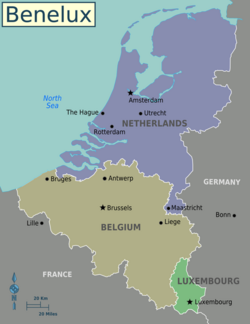 Belgium, the Netherlands and Luxembourg form the Benelux
Belgium, the Netherlands and Luxembourg form the Benelux
This article is a comparison of the Benelux countries.
Geography
Politics
Government
| Country
|
Political systems
|
Power source
|
Power structure
|
| Belgium [1]
|
Parliamentary system
|
Constitutional monarchy
|
Federal state
|
| Netherlands [2]
|
Parliamentary system
|
Unitary state
|
| Luxembourg[3]
|
Parliamentary system
|
| Aruba[4]
|
Parliamentary system
|
| Curaçao[5]
|
Parliamentary system
|
| Sint Maarten[6]
|
Parliamentary system
|
International organisation membership
| Country
|
Council of Europe
|
Benelux Union
|
ECHR
|
European Union
|
NATO
|
OECDa
|
United Nations
|
WTO
|
| Belgium
|
5 May 1949
|
Yes
|
Yes
|
1958
|
4 April 1949
|
13 September 1961
|
27 December 1945
|
Yes
|
| Netherlands
|
5 May 1949
|
Yes
|
Yes
|
1958
|
4 April 1949
|
13 September 1961
|
10 December 1945
|
Yes
|
| Luxembourg
|
5 May 1949
|
Yes
|
Yes
|
1958
|
4 April 1949
|
7 December 1961
|
24 October 1945
|
Yes
|
a Luxembourg, Netherlands and Belgium were among the founders of the predecessor of the OECD, the OEEC, in 1948
Economy
| Country
|
GDP total (PPP)
|
GDP per capita (PPP)
|
GDP total (nominal)
|
GDP per capita (nominal)
|
Gini
|
HDI
|
| Belgium
|
$494.620 billion
|
$43,629
|
$458.651 billion
|
$40,456
|
26.3
|
0.890
|
| Netherlands
|
$856.265 billion
|
$50,339
|
$762.521 billion
|
$44,828
|
26.2
|
0.92
|
| Luxembourg
|
$58.234 billion
|
$100,991
|
$60.176 billion
|
$104,359
|
28.7
|
0.892
|
Demographics
| Country
|
Population
|
Density (per km²)
|
Immigration (%)
|
| Belgium
|
11,250,585
|
363.6
|
2.9
|
| Netherlands
|
17,000,059
|
407.8
|
11.1
|
| Luxembourg
|
562,958
|
194.1
|
44.5
|
Telecommunication
| Country
|
Internet TLD
|
ISO 3166 code
|
Calling code
|
| Belgium
|
.be
|
BE
|
+32
|
| Netherlands
|
.nl, .bq
|
NL
|
+31, +599
|
| Luxembourg
|
.lu
|
LU
|
+352
|
See also
References

